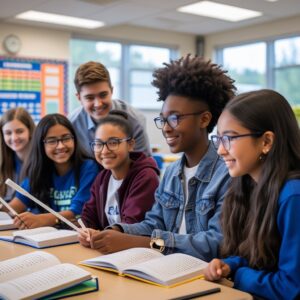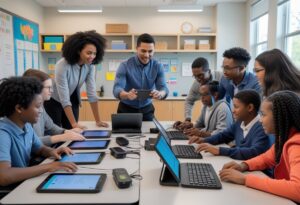Essential Deaf-Blind Training Programs for Independence

Empowering Independence Through Essential Deaf-Blind Training Programs
Our essential training programs for the deaf-blind focus on enhancing independence through personalized support and leading-edge assistive technology. As the leading assistive technology provider for individuals with visual impairments, we at New England Low Vision and Blindness are dedicated to offering training that truly makes a difference in the lives of our clients.
These programs not only cover vital aspects such as orientation and mobility training, tactile communication, and life skills development but also provide access to resources such as comprehensive deaf-blind training designed to meet each individual’s unique needs. By focusing on personal development and skill acquisition, we aim to empower individuals to achieve greater self-sufficiency and confidence in their daily lives.
At the core of our mission is offering hope through innovative solutions that bring tangible results. Collaborating closely with our clients, we provide a supportive environment where they can thrive and reach their full potential, utilizing the most effective assistive technologies available today.
Discover NuCaption: Real-Time Solutions for the Deaf-Blind Community
 Empower communication with NuCaption, the innovative tool designed specifically for the Deaf-Blind community. This real-time captioning solution transforms the way individuals interact with the world, providing clear, accessible, and immediate text translation during conversations. Whether you’re at a meeting, in class, or enjoying social events, NuCaption bridges the gap and fosters inclusive environments.
Empower communication with NuCaption, the innovative tool designed specifically for the Deaf-Blind community. This real-time captioning solution transforms the way individuals interact with the world, providing clear, accessible, and immediate text translation during conversations. Whether you’re at a meeting, in class, or enjoying social events, NuCaption bridges the gap and fosters inclusive environments.
Learn more and explore how NuCaption can transform your experience today. Visit our product page NuCaption – Real-Time Solutions for the Deaf-Blind Community or watch our video.
Essential Deaf-Blind Training Programs for Independence
Deaf-blindness presents unique challenges, particularly in achieving independence. By understanding its nature and the difficulties it poses, we can better address the needs of individuals facing this dual sensory impairment.
Definition and Spectrum of Deaf-Blindness
Deaf-blindness refers to the combined loss of vision and hearing, which greatly impacts communication, education, and daily living. It doesn’t always involve total blindness and deafness; many individuals experience varying degrees of each impairment. This spectrum makes it crucial to tailor support and resources to individual needs.
Our goal at New England Low Vision and Blindness is to provide customized training programs that address the specific degrees of visual and hearing loss experienced by each person. We focus on employing leading-edge technologies to enhance their interaction with their environment.
Challenges in Independence and Daily Living
Living with deaf-blindness can make achieving independence a considerable challenge. Individuals face difficulties with navigation, accessing information, and interacting with others. These challenges are further complicated by the presence of multiple disabilities that often accompany deaf-blindness.
Our training programs empower individuals by developing essential skills needed for daily living and independence. Through tailored approaches, we offer strategies and tools to help overcome barriers. New England Low Vision and Blindness is committed to equipping individuals with the resources to maintain independence and enhance their quality of life.
Our programs focus on practical solutions, such as utilizing tactile communication methods and assistive technology, ensuring that each individual can engage with the world confidently and effectively.
Creating an Empowering Environment
In fostering independence for deaf-blind individuals, building an empowering environment is crucial. This section focuses on the importance of advocacy, peer support, and the role of the Helen Keller National Center.
Importance of Advocacy and Peer Support
Advocacy plays a pivotal role in empowering deaf-blind individuals. Through proactive advocacy, services and accommodations can be better tailored to meet unique needs. The American Association of the Deaf-Blind champions vital causes, ensuring the deaf-blind community is represented.
Peer support provides a platform for shared experiences and learning. Establishing peer support groups allows individuals to connect, share strategies, and grow together. The sense of community in these groups fosters self-confidence and motivates individuals to overcome daily challenges.
Role of the Helen Keller National Center (HKNC)
The Helen Keller National Center stands as a beacon for developing skills and independence in deaf-blind individuals. HKNC provides specialized training programs tailored to personal goals, focusing on communication and mobility. As a comprehensive resource, it offers workshops and skill-building activities designed to promote autonomy.
Collaborating with organizations like the American Association of the Deaf-Blind, HKNC extends its impact. This collaboration ensures that training aligns with advocacy goals, meeting the evolving needs of the community. Through these efforts, HKNC supports individuals in achieving greater independence and self-sufficiency.
Essential Skills for Independence
We focus on empowering individuals with essential skills that enable independent living through targeted training programs. Our approach includes specialized orientation and mobility training as well as independent living skills enhanced by vision rehabilitation.
Orientation and Mobility Training
Orientation and mobility training is crucial for those who are deaf-blind, enhancing their ability to navigate and interact with their environment. Certified orientation and mobility specialists work closely with individuals to develop personalized strategies that promote safe and efficient travel. Techniques include the use of tactile and visual signals to improve spatial awareness.
Training involves comprehensive instruction on using assistive devices like canes or technology that aid navigation. Through these methods, clients gain confidence in moving through different environments, from crowded urban settings to quiet rural areas. Ultimately, our goal is to equip individuals with the skills needed to travel independently and confidently.
Independent Living Skills and Vision Rehabilitation
Independent living skills are vital for managing daily life tasks effectively. Vision rehabilitation therapy plays a pivotal role in teaching adaptive methods for activities such as cooking, budgeting, and personal care. Individuals learn to utilize assistive technology and techniques to maintain their homes and handle routine chores independently.
Our programs focus on tailoring strategies to meet each person’s unique needs, fostering self-sufficiency. Experienced professionals provide training on adaptive techniques to ensure that everyday tasks are manageable despite sensory challenges. By enhancing these fundamental skills, clients can lead more autonomous lives, engaging in activities they enjoy and managing daily responsibilities with ease.
Educational Pathways and Training Programs
We understand the importance of providing essential educational and training opportunities for individuals who are deaf-blind. Our focus is on creating pathways through certification programs and specialized courses at higher education institutions. These initiatives are designed to foster independence and enhance skills for thriving in various aspects of life.
Certification for Specialists
Certification programs are vital for those aiming to work professionally with the deaf-blind community. These programs ensure that specialists possess the necessary skills and knowledge to support the unique needs of individuals who are deaf-blind. Certifications often cover areas such as communication techniques, assistive technology, and personalized education plans.
Professionals may seek certifications like the Certified Assistive Technology Instructional Specialist (CATIS). Courses include practical training in rehabilitation and education, enabling specialists to assist in job placement and daily living skills. The certification ensures a standard of excellence, allowing us to provide high-quality services.
Deaf-Blind Training at Colleges and Universities
Higher education institutions, including Indiana State University, offer specialized training programs for deaf-blind students and professionals. These programs focus on integrating assistive technologies and leading-edge teaching methods. Colleges provide comprehensive courses addressing various aspects of independence, such as vocational skills and social interaction.
Such programs are crucial in equipping individuals with the tools they need to succeed beyond the classroom. They include a blend of theoretical knowledge and practical application. Our commitment to these educational pathways highlights our role in empowering the deaf-blind community through university-level education and beyond.
Technological Advancements and Assistive Devices
The landscape of assistive technology for individuals who are deaf-blind has transformed with leading-edge solutions. By enhancing communication and mobility, these advancements support a range of adaptive equipment that improves daily independence and access.
Modern Assistive Technology for Deaf-Blind Individuals
We provide many leading-edge technologies designed specifically for individuals with combined vision and hearing losses. Braille displays and notetakers enable tactile interaction with digital content, offering a seamless bridge between real-world tasks and digital communication. Assistive technology like tactile sign language gloves translate sign languages into text or speech and vice versa, facilitating interpersonal communication.
Screen readers and magnification software are essential for enhancing visual acuity, amplifying text and digital content. These tools are crucial for learners and professionals alike, ensuring that users can access information effectively. By leveraging such technology, we bring hope to individuals who are visually impaired, opening pathways to greater autonomy.
Adaptive Equipment and Communication Access
Adaptive equipment makes essential interactions more accessible, especially for those with visual and auditory challenges. Devices like hearing aids embedded with Bluetooth and innovative mobility aids help navigate environments confidently. This equipment bridges gaps in communication access, ensuring that one can connect and communicate effectively.
Additionally, voice recognition software and speech-generating devices offer significant support by translating spoken language into text or signals. With our expertise at New England Low Vision and Blindness, we help individuals find personalized solutions that align with their unique needs. This fosters an environment where adaptability and communication are seamlessly integrated into daily living.
Transition Services and Community Integration
Achieving independence for those who are deaf-blind involves comprehensive transition services and valuable community integration opportunities. From mastering independent living skills to finding a place in the workforce, these services are vital.
Supporting Transition to Independent Living
To empower individuals in their shift to independent living, critical transition services focus on enhancing life skills such as orientation and mobility, tactile communication, and daily living activities. These essential services provide tailored information and referrals for accessing necessary support systems.
With leading-edge assistive technologies, we facilitate tools and training to improve day-to-day independence. Orientation and mobility training helps navigate real-world environments safely, while life skills development builds confidence. Programs embracing these aspects enable seamless participation in community activities and foster a meaningful, independent life.
Integration into the Workforce and Society
We acknowledge the importance of integrating individuals who are deaf-blind into the workforce and society. This integration involves equipping individuals with job-related skills and providing vocational training. Such programs emphasize self-sufficiency and career growth by focusing on adaptable skills for diverse work environments.
Partnerships with organizations pave the way for accessible employment opportunities. By offering deaf and hard of hearing services, we ensure effective communication and adaptation in professional settings. Community connections further enhance social interaction and integration, leading to a fulfilling life where everyone can contribute to society effectively.
Frequently Asked Questions
We address several common questions about deaf-blind training programs. These include program components for independence, technology’s role in communication, and educational strategies for dual sensory loss.
What are the major components of independence training programs for individuals who are deaf-blind?
Independence training for deaf-blind individuals involves a focus on orientation, mobility, and daily living skills. Programs teach techniques that help navigate environments safely and efficiently, such as orientation and mobility training. This training is crucial for enhancing personal autonomy.
How do independent living skills programs cater to the unique needs of deaf-blind adults?
Programs are tailored to address dual sensory loss by providing customized strategies for managing day-to-day activities. Adaptations are developed to suit varying levels of vision and hearing loss, enhancing one’s ability to live independently and confidently in their community.
What technologies are most beneficial for enhancing communication for people with deaf-blindness?
Technology plays a vital role in bridging communication gaps. Devices like refreshable braille displays and speech-to-text software are invaluable tools. They enable efficient communication and enhance life skills through accessible technology.
What educational approaches are effective in teaching students with dual sensory loss?
A personalized approach, utilizing tactile learning and adaptive communication methods, proves effective. Education programs often incorporate both technological tools and hands-on activities to meet unique learning needs and boost comprehension.
How do intervention strategies differ between varying levels of deaf-blindness?
Intervention strategies are customized to the individual’s degree of vision and hearing loss. Techniques are adapted to maximize remaining senses, with communication methods adjusted to ensure accessibility. Personalized support is key to maximizing engagement and efficacy.
What resources are available for deaf-blind individuals seeking vocational training?
Numerous vocational training resources focus on skill development for employment opportunities. These incorporate job readiness and workplace support, aiming to foster meaningful careers and economic independence.
Experience Empowerment with Our Deaf-Blind Training
Unlock independence and enhance accessibility with our specialized Deaf-Blind Training services. Whether you’re an individual seeking tailored solutions, an organization striving to create inclusive environments, or a caregiver aiming to support loved ones, our training is designed to provide practical tools and strategies.
Learn More & Get Started Today
Discover NuCaption: Real-Time Solutions for the Deaf-Blind Community
 Empower communication with NuCaption, the innovative tool designed specifically for the Deaf-Blind community. This real-time captioning solution transforms the way individuals interact with the world, providing clear, accessible, and immediate text translation during conversations. Whether you’re at a meeting, in class, or enjoying social events, NuCaption bridges the gap and fosters inclusive environments.
Empower communication with NuCaption, the innovative tool designed specifically for the Deaf-Blind community. This real-time captioning solution transforms the way individuals interact with the world, providing clear, accessible, and immediate text translation during conversations. Whether you’re at a meeting, in class, or enjoying social events, NuCaption bridges the gap and fosters inclusive environments.
Learn more and explore how NuCaption can transform your experience today: NuCaption – Real-Time Solutions for the Deaf-Blind Community.



